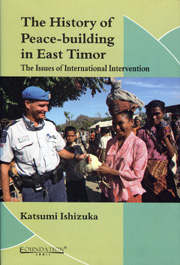Book contents
- Frontmatter
- Contents
- Preface
- Acknowledgements
- Acronyms
- Introduction
- Section 1 Historical Background
- Chapter I East Timor in the Cold War Period
- Chapter II Pro-Indonesia Militia Campaigns and International Response in 1999
- Section 2 Policy Analysis
- Section 3 Comparative Analysis
- Conclusion
- Bibliography
- Index
Chapter I - East Timor in the Cold War Period
from Section 1 - Historical Background
Published online by Cambridge University Press: 26 October 2011
- Frontmatter
- Contents
- Preface
- Acknowledgements
- Acronyms
- Introduction
- Section 1 Historical Background
- Chapter I East Timor in the Cold War Period
- Chapter II Pro-Indonesia Militia Campaigns and International Response in 1999
- Section 2 Policy Analysis
- Section 3 Comparative Analysis
- Conclusion
- Bibliography
- Index
Summary
The Origin of the East Timor Issue
East Timor had a long history as a neglected Portuguese colony for four centuries. There was little investment from Portugal in infrastructure, health facilities or education. Sandalwood and coffee had been the only export industries. An economic slump in Portugal in 1889 urged a Portuguese Royal Commission meeting to reach the following conclusion in terms of control over its colonies.
The state … should have no scruples in obliging and if necessary forcing these rude Negroes in Africa, these ignorant Pariahs in Asia, the half savages in Oceania to work, that is, to better themselves by work, to acquire through work the happiest means of existence, to civilise themselves through work.
A series of acts of decolonisation in the 1960s encouraged Portugal to promote early independence of its colonies. However, its ‘rash’ policy was not considered to comply with Article 73, Chapter XI of the UN Charter:
Members of the United Nations which have or assume responsibilities for the administration of territories whose peoples have not yet attained a full measure of self-government recognize the principle that the interests of the inhabitants of these territories are paramount… .
In 1960, the UN General Assembly adopted resolution 1541 (XV), which urged colonial powers, in particular implying Portugal, to transit information to the UN Secretary-General under Article 73(e) of the Charter in respect of such territories whose peoples have not yet attained a full measure of self-government, including East Timor.
- Type
- Chapter
- Information
- The History of Peace-Building in East TimorThe Issues of International Intervention, pp. 3 - 38Publisher: Foundation BooksPrint publication year: 2010

